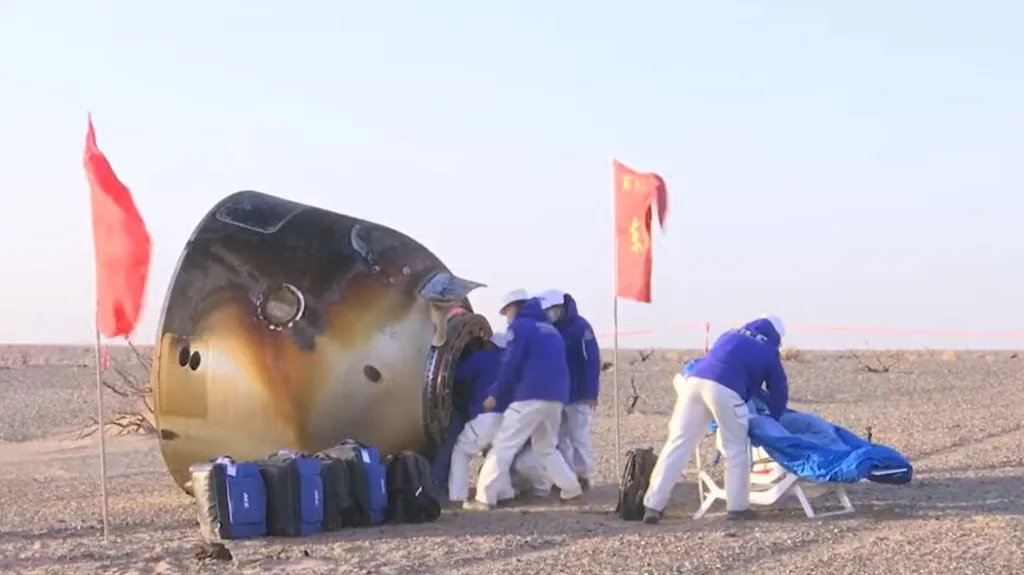Science
Chinese Astronauts Successfully Return After Space Junk Delay

The crew of the Shenzhou-20 spacecraft returned to Earth on November 14, 2025, following a delay caused by damage from space debris. Originally scheduled to land on November 5, the astronauts were forced to postpone their return after an impact cracked a window on their spacecraft. The three-person team, consisting of Chen Dong, Chen Zhongrui, and Wang Jie, departed the Tiangong space station aboard the newly arrived Shenzhou-21 spacecraft.
The delay prompted a thorough inspection of the Shenzhou-20 by the six taikonauts currently stationed in orbit, with support from mission controllers at the China Manned Space Agency (CMSA). According to a statement released by the China Manned Space Engineering Office (CMSEO) on November 11, the assessment process was progressing well, and backup plans were in place to ensure the crew’s safe return.
At 10:14 p.m. EST (7:14 p.m. PST) on November 13, the crew successfully departed the station and landed in Inner Mongolia at 11:14 a.m. Beijing Time on November 14 (9:14 p.m. EST; 6:14 p.m. PST, November 15). Following their landing, medical teams evaluated the astronauts and confirmed they were in good health, as reported by the state-owned media outlet Xinhua.
Reflecting on the mission, Chen Dong remarked, “Space exploration has never been easy for humankind. This mission was a true test, and we are proud to have completed it successfully.” He emphasized the commitment of China’s space program to astronaut safety, noting that all teams involved performed exceptionally well.
Mission Achievements and Future Plans
The Shenzhou-20 mission marked several significant milestones for China’s space program. Commander Chen Dong completed six extravehicular activities, earning the distinction of being the taikonaut with the most such tasks to date. The crew also became the first to spend over 200 consecutive days in space, showcasing their resilience and adaptability under challenging circumstances.
Moreover, the astronauts shared a unique experience by enjoying a barbecued meal in space, which celebrated the arrival of the Shenzhou-21 crew—comprising Zhang Lu, Wu Fei, and Zhang Hongzhang. This mission, despite its delays, exemplifies China’s preparedness for unexpected situations in space, as the CMSEO confirmed that operations aboard the Tiangong space station will continue smoothly.
The launch of the Shenzhou-21 from the Jiuquan Satellite Launch Center on October 31, 2025, facilitated the transition between crews. However, the departure of the Shenzhou-20 crew left the Shenzhou-21 team without a designated return plan. This gap is expected to be addressed with the upcoming launch of the Shenzhou-22 spacecraft, which will not carry a crew, thus maintaining operational continuity.
As the International Space Station (ISS) nears retirement, China aims for the Tiangong space station and future projects to play a pivotal role in advancing human exploration and scientific research in Low Earth Orbit (LEO). The successful return of the Shenzhou-20 crew underscores the growing capabilities of China’s space program and its commitment to fostering a safe and effective environment for astronauts.
-

 Lifestyle4 months ago
Lifestyle4 months agoLibraries Challenge Rising E-Book Costs Amid Growing Demand
-

 Sports4 months ago
Sports4 months agoTyreek Hill Responds to Tua Tagovailoa’s Comments on Team Dynamics
-

 Sports4 months ago
Sports4 months agoLiverpool Secures Agreement to Sign Young Striker Will Wright
-

 Lifestyle4 months ago
Lifestyle4 months agoSave Your Split Tomatoes: Expert Tips for Gardeners
-

 Lifestyle4 months ago
Lifestyle4 months agoPrincess Beatrice’s Daughter Athena Joins Siblings at London Parade
-

 World4 months ago
World4 months agoWinter Storms Lash New South Wales with Snow, Flood Risks
-

 Science4 months ago
Science4 months agoTrump Administration Moves to Repeal Key Climate Regulation
-

 Science3 months ago
Science3 months agoSan Francisco Hosts Unique Contest to Identify “Performative Males”
-

 Business4 months ago
Business4 months agoSoFi Technologies Shares Slip 2% Following Insider Stock Sale
-

 Science4 months ago
Science4 months agoNew Tool Reveals Link Between Horse Coat Condition and Parasites
-

 Sports4 months ago
Sports4 months agoElon Musk Sculpture Travels From Utah to Yosemite National Park
-

 Science4 months ago
Science4 months agoNew Study Confirms Humans Transported Stonehenge Bluestones









